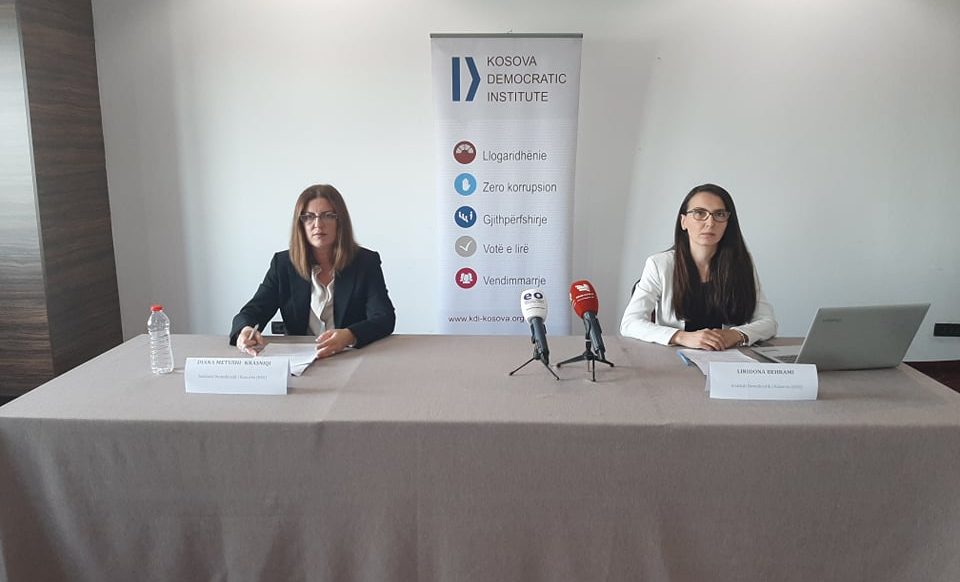


Today, KDI unveiled preliminary findings from monitoring of the bidding processes at the Ministry of Health on medical products and equipment during pandemics.
One of the issues of the highest priority during the crisis such the case with COVID-19 pandemics, is preventing and addressing all the risks of corruption in the health care system. To analyze how the Ministry of Health has addressed these risks, KDI analyzed the sample of 9 tenders for medical equipment and products through the negotiated procedures without the contract notice publication, that were announced during the period March 4 – April 28, 2020.
From the perspective of institutional transparency, all tender dossiers, decisions on selection of successful operators in tenders, notices for awarding and signing contracts and the contracts were made public on the electronic platform “E-procurement”. Whereas, the requests from the requesting units, the minutes of the negotiation, the invitations for the offers that the Ministry of Health had sent to the Economic Operators, KDI had provided through the requests for access to public documents. The Ministry of Health has provided access to all this information within the legal deadlines.
The Ministry of Health, based on the needs created during the situation with pandemics, prior to each procurement activity, has notified the Public Procurement Review Committee that it would use the legal provisions that allow the use of the negotiated procedure, without publishing the contract notice. Moreover, it had formed a Commission to collect reference prices for medical equipment and products for protection against Covid-19, on the basis of which the values provided in all tenders were later determined.
However, there were cases when this Commission did not conduct a proper assessment of the reference prices, by including in the calculations the abnormally low and abnormally high prices presented by the economic operators, which then affected the offer. This has been observed in the purchase of surgical gloves. In this case, if commission would have eliminated abnormally low and abnormally high prices from the calculation then the reference price per unit would have been 0.24 euros. Consequently, the MoH would have paid the total amount of 80,709.33 euros and not 159,071.3 euros for three lots of surgical gloves, as much as it actually paid. Potentially for these three lots alone, over 60,000 euros would have been saved.
Despite the fact that the Ministry of Health had conducted preliminary market research, it had managed to provide only 70 out of the 120 required products, with a total value of 7,093,272.57 euros. This was due to the lack of offers from economic operators and the enormous increase of prices for products, but also due to the absence of continuous market research by the Ministry of Health, at a time when the market has undergone changes on a daily basis.
In terms of competition, the Ministry of Health in these 9 tenders, for each activity had invited three to 21 economic operators for bidding, although negotiated procedures require the contracting authority to invite for bidding 3 to 6 economic operators. However, it is worrisome that only a small number of economic operators submitted bids, in some cases with prices even higher than market prices.
KDI had found that prices for the same products and equipment vary from contract to contract. Ministry of Health in some cases had managed to provide up to 42 %lower prices than the estimated value, while in other cases the MoH had paid up to 74% higher prices than the estimated value. For illustration, the contracted price per unit for protective clothing from Covid-19, in the contract dated March 4, 2020 was 7 euros, while in the contract of April 28 the contracted price was 12.20 euros per unit, which is an increase of 74% from the price provided through the first contract, although the required amount had increased by 4000%.
As for laboratory materials for testing, products with no. 6, 7, 8, 9, 10 purchased through two contracts with procurement no. 206-20-959-1-2-5 and 206-20-1224-1-1-5, although there was also an increase in quantity from 25% to 166%, the MoH provided prices that were 13% to 42% cheaper.
After receiving the offers for the tender dated March 4, 2020 for the supply of protective equipment, there has been an increase in prices by the economic opearator (especially the price of masks) and this has prompted the MoH to request from the Kosovo Police-Investigation Department and the Kosovo Competition Authority (ACA), investigation of these contracts.
To address the concerns raised on alleged overpricing and the lack of supplies through emergency contracts of Ministry of Health at the time of the pandemic, and to ensure that the emergency situation did not affect in favor of some specific companies, KDI calls the justice institutions and the National Audit Office to investigate and audit all expenses during pandemic, to ensure that citizen’s money was used fairly and correctly.
KDI urges the Kosovo Competition Authority to take the necessary action to investigate the rise in prices by economic operators for medicinal products and equipment, and to take appropriate measures if market manipulation is proven in a humanitarian crisis.
The Ministry of Health should request to the Commission that while analyzing prices, it should not take into considerarion abnormally low and abnormally high prices, as this is distorting the calculation of the exact value predicted, affecting in supply, competition and in public spending. Reference prices are also required to be updated on a regular basis.
In order to be as transparent as possible with the public, we invite the Ministry of Health to publish on the “E-procurement“ platform all documents regarding the procurement activities during pandemics, including calls for offer, bids and reports of receipt of documents. We also require from the Government to publish all decisions related to budget allocations for the health sector.
The full KDI research will be available to the public next week.